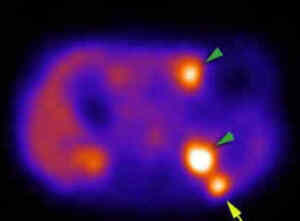by
Barbara Kram, Editor | November 20, 2008

PET scans have
significant treatment
planning implications
Physicians participating in the National Oncologic PET Registry (NOPR) reported changing the treatment plan for 43.1 percent of their patients undergoing cancer treatment as the result of information gained from a PET scan. Data were analyzed for PET scans performed through the NOPR program specifically for monitoring cancer therapy. According to results published online November 17 in the journal Cancer, the major changes physicians made in the intended management of their cancer patients as a result of the PET scan included: 1) changing to another chemotherapy agent, 2) changing the mode of therapy, or 3) changing the current dose or duration of therapy.
Currently, PET imaging is not considered the standard of care for monitoring the effects of cancer therapy and, therefore, is not paid for by most insurance companies. However, under Medicare's NOPR program launched in May 2006, the agency began paying for PET (and PET integrated with computed tomography) scans for the purpose of cancer treatment monitoring.
Study data were analyzed for 8,240 patients who had 10,497 treatment-monitoring PET scans performed at 946 imaging centers to monitor chemotherapy alone (82 percent of scans), radiation therapy alone (6 percent of scans), or combined chemo-radiation therapy (12 percent of scans). The authors reported the treating physicians altered their patients' intended care by switching to another chemotherapy agent as a result of approximately 26.5 percent of the PET scans performed and were prompted to adjust the dose or duration of treatment as a result of approximately16.5 percent of the scans performed.



Ad Statistics
Times Displayed: 173705
Times Visited: 3172 For those who need to move fast and expand clinical capabilities -- and would love new equipment -- the uCT 550 Advance offers a new fully configured 80-slice CT in up to 2 weeks with routine maintenance and parts and Software Upgrades for Life™ included.
Overall, the treating physician judged the patient's prognosis as a result of the PET scan was better or improved for 42.1 percent of scans, unchanged for 31.5 percent of scans, and worse for 26.4 percent of scans. "The referring physician's assessment of prognosis in light of the PET findings was associated strongly with changes in the management", said Bruce Hillner, M.D., lead author for the study and professor and eminent university scholar in the Department of Internal Medicine at Virginia Commonwealth University. "We also learned that these modifications occur predominantly after scans in which PET demonstrates more extensive disease than what was anticipated."
Co-author Barry Siegel, MD, professor of radiology and chief of the Division of Nuclear Medicine at Washington University's Mallinckrodt Institute of Radiology, commented, "Using PET to monitor cancer treatment appears to have broad benefit as we found that the change in a patient's intended treatment didn't significantly differ for those patients whose scans indicated local and regional disease versus those with metastatic disease."
Previous published NOPR studies, reported physicians changed the intended care of more than one in three cancer patients as a result of a PET scan performed for the purpose of cancer diagnosis, staging, restaging and recurrence and that these changes are consistent across cancer types and reasons for ordering the exam.
The NOPR was established in response to the Center for Medicare and Medicaid Services' (CMS) novel "Coverage with Evidence" policy to collect data through a clinical registry to inform the center's FDG-PET coverage determination decisions for currently non-covered cancer indications.
The project is sponsored by the Academy of Molecular Imaging (AMI) and managed by the American College of Radiology (ACR) and the ACR Imaging Network (ACRIN). For more information about the NOPR, go to www.cancerPETregistry.org.
Source: American College of Radiology

